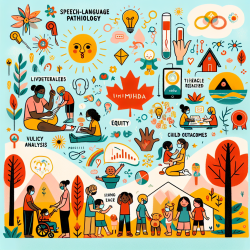Adolescents with intellectual disabilities face unique challenges that can impact their academic, social, and psychological development. A recent study titled
Study protocol: a randomized controlled trial testing the effectiveness of an online mindset intervention in adolescents with intellectual disabilities sheds light on how online mindset interventions can make a significant difference. Here’s how practitioners can leverage these findings to enhance their practice.
The Growth Factory: A Promising Online Intervention
The study introduces "The Growth Factory," an online intervention aimed at teaching adolescents with intellectual disabilities a growth mindset. This intervention is based on the principles of Carol Dweck's mindset theory, which posits that individuals with a growth mindset believe that their abilities can be developed through dedication and hard work. The randomized controlled trial (RCT) conducted to test the effectiveness of this intervention involved adolescents aged 12-23 with mild to borderline intellectual disabilities.
Key Findings and Practical Implications
The RCT revealed several key outcomes that practitioners can incorporate into their therapeutic approaches:
- Improved Mindset: Adolescents who participated in "The Growth Factory" showed significant improvements in their growth mindset compared to the control group. This shift in mindset can lead to better academic and psychosocial outcomes.
- Enhanced Empowerment: Participants reported increased feelings of empowerment, indicating that they felt more in control of their lives and capable of overcoming challenges.
- Behavioral Improvements: The intervention led to a reduction in behavior problems, including both internalizing (e.g., anxiety, depression) and externalizing (e.g., aggression) issues.
- Boosted Self-Esteem: Adolescents in the intervention group experienced a notable increase in self-esteem, which is crucial for their overall well-being and development.
- Therapeutic Alliance: The study found that a growth mindset positively impacts the therapeutic relationship, fostering a more collaborative and productive interaction between the adolescent and the therapist.
Implementing Growth Mindset Interventions
Practitioners can integrate the principles of "The Growth Factory" into their practice by:
- Incorporating Growth Mindset Lessons: Use materials and activities that emphasize the malleability of abilities and the importance of effort and perseverance.
- Setting Growth-Oriented Goals: Help adolescents set realistic and challenging goals that focus on learning and development rather than fixed outcomes.
- Providing Positive Feedback: Reinforce effort and progress rather than innate ability, encouraging a focus on growth and improvement.
- Using Digital Tools: Leverage online platforms and digital tools to deliver mindset interventions, making them accessible and engaging for adolescents with intellectual disabilities.
Encouraging Further Research
While "The Growth Factory" has shown promising results, continued research is essential to refine and expand the application of mindset interventions. Practitioners are encouraged to:
- Participate in Research: Engage in studies and trials to contribute to the growing body of evidence on the effectiveness of mindset interventions.
- Share Insights: Collaborate with researchers and other practitioners to share experiences and best practices in implementing these interventions.
- Stay Informed: Keep up-to-date with the latest research and developments in the field of mindset interventions and intellectual disabilities.
Conclusion
The study on "The Growth Factory" demonstrates the potential of online mindset interventions to empower adolescents with intellectual disabilities. By fostering a growth mindset, practitioners can help these adolescents achieve better academic, social, and psychological outcomes. To read the original research paper, please follow this link:
Study protocol: a randomized controlled trial testing the effectiveness of an online mindset intervention in adolescents with intellectual disabilities.










